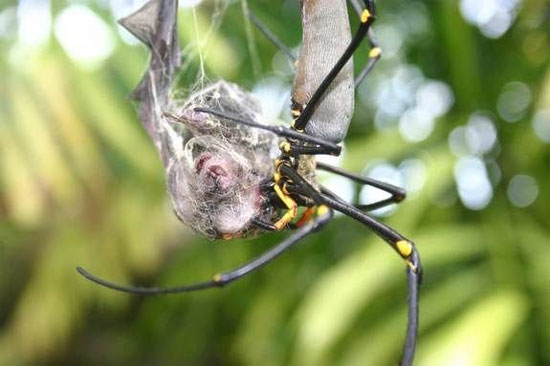The battle between spiders and bats
Antarctica is the only place where humans cannot witness the sight of re-bat-eating spiders, scientists claim.

A spider eats bat in Australia. (Photo: Livescience)
Bats are one of the most successful animal groups on the planet. With more than 1,200 species, bats account for about 20% of the total number of mammals. Like owls, cut birds and snakes, bats have very few natural enemies.
But bats are the prey of many invertebrates. For example, giant centipedes in Venezuela can eat bats. People have also seen fritters eating young bats when they fall to the bottom of a cave. But recently scientists have discovered another enemy of the bat. That is the spider.
Martin Nyffeler, a University of Ulm researcher in Germany and Mirjam Knörnschild, an expert at the University of Basel in Switzerland, analyzed more than 100 spider studies to understand their bat eating behavior, Livescience reported. . They found this phenomenon on every continent except Antarctica.
The ability to locate by ultrasound helps bats detect spider web easily. If it hits a spider web, only the most secure networks can keep them. Most spider webs will rip when bats hit them. Therefore, most bats attached to spider webs are small or young, with wingspan of 10 to 24cm. Sometimes they die from exhaustion, hunger, dehydration or overheating after getting caught in the spider web. But if they don't die, spiders will actively attack to destroy the prey.
- Video: Poisonous spider eating bat
- How do bats spread disease globally?
- Spiders re-solidify and birds
- Discover new bats on dogs in Panama and Ecuador
- Terrible hot sun causes bats to fall like a fig in Australia
- Hornets were killed with spiders, storks stabbed both
- Science has proven: Spider is a friend, not an enemy!
- Discover panda bat in South Sudan
- Many new and rare spiders are found in Australia and India
- Discover 4 strange bat species
- New discoveries about bats: Male bats use food to propose
- Science determines the time when spiders are most likely to occur in the home
 Animal 'suffering' after hibernation
Animal 'suffering' after hibernation Why do goats climb well?
Why do goats climb well? Scientists were surprised to see chimpanzees eating turtles
Scientists were surprised to see chimpanzees eating turtles Giant catfish died deadly due to drought in Thailand
Giant catfish died deadly due to drought in Thailand The world's largest mammal migration
The world's largest mammal migration  Bats pretend to be wasps to avoid being eaten by owls
Bats pretend to be wasps to avoid being eaten by owls  The world's most beautiful library uses 'bats' to preserve old books and manuscripts
The world's most beautiful library uses 'bats' to preserve old books and manuscripts  Bats and Enviable Superpowers
Bats and Enviable Superpowers  Specter bats specialize in cannibalism
Specter bats specialize in cannibalism  Devil bats kiss their species in exchange for blood
Devil bats kiss their species in exchange for blood 